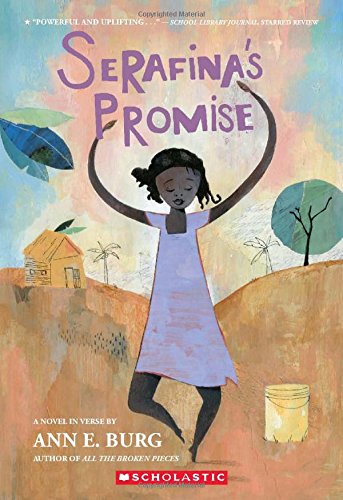
by Rachel Toalson | Books
I’m always a sucker for novels in verse. Ann E. Burg is one of my favorite authors who writes in this style.
Her book Serafina’s Promise is a middle grade story about life in Haiti and a girl who dreams of a better future than her community can offer her. It was a lovely book.
Here are three things I enjoyed most about it:
The simplicity. Burg is a master at taking a complicated story (like life in Haiti) and distilling it down to the barest parts that will have the most impact on readers. This book was a beautiful representation of what modern life in Haiti is like. It examines what it’s like not to be able to go to school even if you wanted to. My sons take their access to education for granted here in the states, and it was a good reminder for them that not everyone has the same opportunities they have.
The emotion. There was so much longing in this story. So much courage. So much sweetness. Emotion was wrapped up in every line of this story.
The hope. This is something I love about middle grade literature: even when it deals with hard things—like floods and makeshift homes and earthquakes and the inability to go to school because of poverty—it ends on a hopeful note. This book was no different. The character of Serafina was a fantastically drawn representation of an 11-year-old with a dream.
Serafina’s Promise is one of those books to be read and re-read and re-read again.
The above is an affiliate link. I only recommend books that I personally enjoy. I actually don’t even talk about the books I don’t enjoy, because I’d rather forget I ever wasted time reading them. But if you’re ever curious whether I’ve read a book and whether I liked or disliked it, don’t hesitate to ask.
by Rachel Toalson | Books
I kept seeing Holly Goldberg Sloan’s Short on the library shelf, and I finally decided to pick it up and read it. I’m so glad I did.
The book is about a girl who just lost her dog, whom she loved, and, to cheer her up for the summer, her mom signs her up for a local community production of The Wizard of Oz. It’s a story about a girl coming to terms with loss, growing up, and the expectations we hold for our lives.
Here are three of my favorite things about Short:
The personality. Julia, the main character, was such a strong, wonderful personality, and that came through clearly in the book. It was sweet and refreshing to hear a girl with such opinions and interests.
The sweet story. This was a true coming-of-age tale that children will identify with and learn from, as can be seen by the last lines of the book:
“I grew this summer.
Not on the outside, but on the inside.
And that’s the only place where growing really matters.”
The engaging nature of the voice. Julia, because of her quirky voice, was a very engaging character, and the opinions she would voice were so much like what I imagine is going through the mind of a child or adolescent (sort of random but also connected in a strange way). Sloan has a knack for highlighting an adolescent’s associative thinking, and it’s a brilliant way to engage young readers.
All in all, Short was an incredibly sweet story that I’ll be recommending to my boys with gushing praise.
The above is an affiliate link. I only recommend books that I personally enjoy. I actually don’t even talk about the books I don’t enjoy, because I’d rather forget I ever wasted time reading them. But if you’re ever curious whether I’ve read a book and whether I liked or disliked it, don’t hesitate to ask.
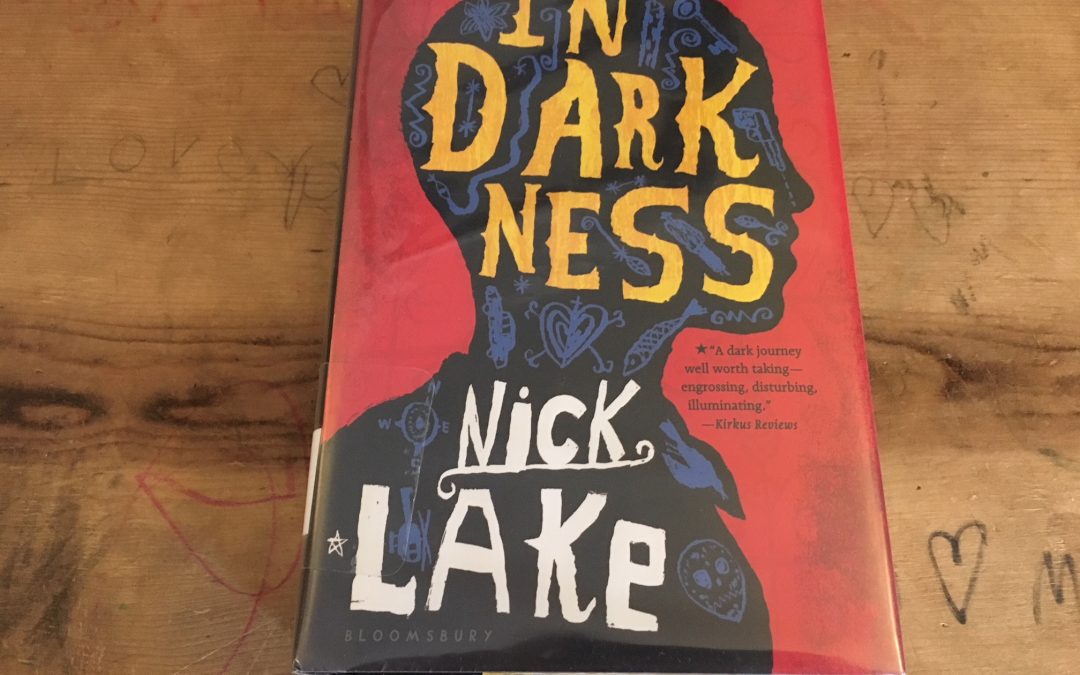
by Rachel Toalson | Books
I’ve been slowly making my way through old award-winning young adult novels, and In Darkness, by Nick Lake, was next on my list. While it was somewhat long, I found it very interesting.
In Darkness is the story of a boy who is caught beneath some hospital ruins after an earthquake in Haiti. But what makes it so interesting is that it intersperses Haitian culture and folklore with chapters that tell the story of the main character, Shorty.
Here are three things I enjoyed most about In Darkness:
- The personality. Shorty was a very engaging narrator, and there was plenty in the first few pages to make you like him, even though he was a gangster and had killed people on the streets of Haiti. You understood his choices and why he did the things he did, and his voice and the way he told his story naturally endeared you to him. Although he was not necessarily an honorable character, you couldn’t help but care for him.
- The folklore. Each chapter that told Shorty’s story was followed by a chapter that told the story of Toussaint, the liberator of Haiti, who freed all the slaves (according to folklore and some historical proof) and became sort of a mythical legend in Haitian culture. The folklore elements were interesting asides that came together in a big way at the end.
- The window into the world of Haiti. You could tell that Lake had done his research into what it was like living on the streets of Haiti. You could see the slums take shape in your mind and the personality of the different gangs and the choices people made to survive them. It was magnificently done.
My favorite lines in the book were the opening ones:
“I am the voice in the dark, calling out for your help.
“I am the quiet voice that you hope will not turn to silence, the voice you want to keep hearing cos it means someone is still alive. I am the voice calling for you to come and dig me out. I am the voice in the dark, asking you to unbury me, to bring me from the grave out into the light, like a zombi.
“I am a killer and I have been killed, too, over and over; I am constantly being born. I have lost more things than I have found; I have destroyed more things than I have built. I have seen babies abandoned in the trash and I have seen the dead come back to life.
“I first shot a man when I was twelve years old.
“I have no name. There are no names in the darkness cos there is no one else, only me, and I already know who I am (I am the voice in the dark, calling out for your help), and I have no questions for myself and no need to call upon myself for anything, except to remember.
“I am alone.
“I am dying.”
Of course you have to keep reading. And you will.
The above is an affiliate link. I only recommend books that I personally enjoy. I actually don’t even talk about the books I don’t enjoy, because I’d rather forget I ever wasted time reading them. But if you’re ever curious whether I’ve read a book and whether I liked or disliked it, don’t hesitate to ask.
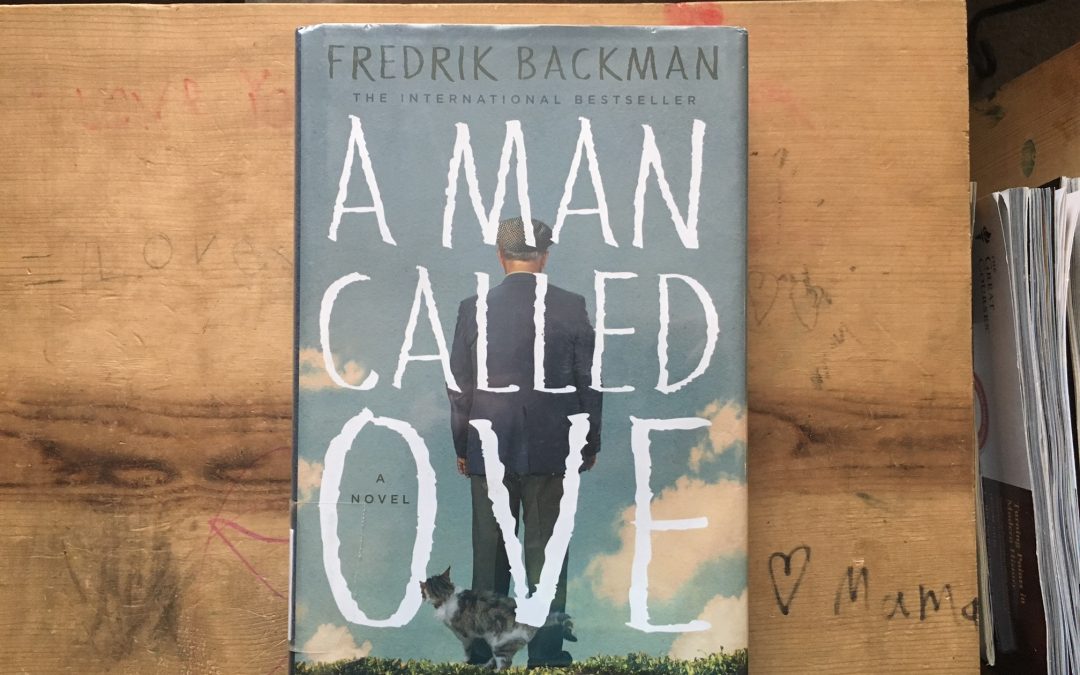
by Rachel Toalson | Books
I cannot get enough of Fredrik Backman. I’m not the kind of person who reads obsessively any adult author, because I prefer kid-lit and young adult books. But him, well. He is fantastic.
A Man Called Ove was the first of his books I read, because my book club chose it as the monthly read. It was immediately addictive in a way you wouldn’t normally consider makes a book addictive.
The story is about an old curmudgeon who cannot be convinced to deviate from his principles. He watches some new neighbors move in, and, of course, they’ll change him entirely.
It was such a sweet story and written so well that I needed to find everything Backman had written. I’m on the third book right now, and every one of them has been as good as this one.
Here are three things I enjoyed most about A Man Called Ove:
- The voice. Backman captured the voice of an old grouchy man so spectacularly that I could not put this book down, even though it wasn’t an action-packed read. But Ove was engaging, in spite of his cranky thoughts and feelings, and it made me laugh out loud many times.
- The bittersweet. Though Ove was a cranky, cheap man, he was, at his core, sweet and kind and fought with a passion for the things he believed in and loved. He lived with regrets, just like any other man, and he had a deep sadness that he did not want to show (but, of course, would). He was a perfectly, thoroughly lovable character.
- The humor. Because of Ove’s character, there were many humorous spots in the book, because he was so curmudgeonly about everything. Even the descriptions of the people he met would show his grumpy demeanor. It was fantastic.
You can see part of the personality that Backman put into the book by reading the chapter names:
A Man Called Ove Buys a Computer that is not a Computer
A Man Called Ove Makes His Neighborhood Inspection
A Man Called Ove Backs Up With a Trailer
A Man Called Ove Does Not Pay a Three-Kronor Surcharge
Here’s the opening:
“Ove is fifty-nine.
He drives a Saab. He’s the kind of man who points at people he doesn’t like the look of, as if they were burglars and his forefinger a policeman’s flashlight. He stands at the counter of a shop where owners of Japanese cars come to purchase white cables. Ove eyes the sales assistant for a long time before shaking a medium-sized white box at him.”
This is most definitely a book I will have to read again, as well as the rest of this author’s backlist.
The above is an affiliate link. I only recommend books that I personally enjoy. I actually don’t even talk about the books I don’t enjoy, because I’d rather forget I ever wasted time reading them. But if you’re ever curious whether I’ve read a book and whether I liked or disliked it, don’t hesitate to ask.
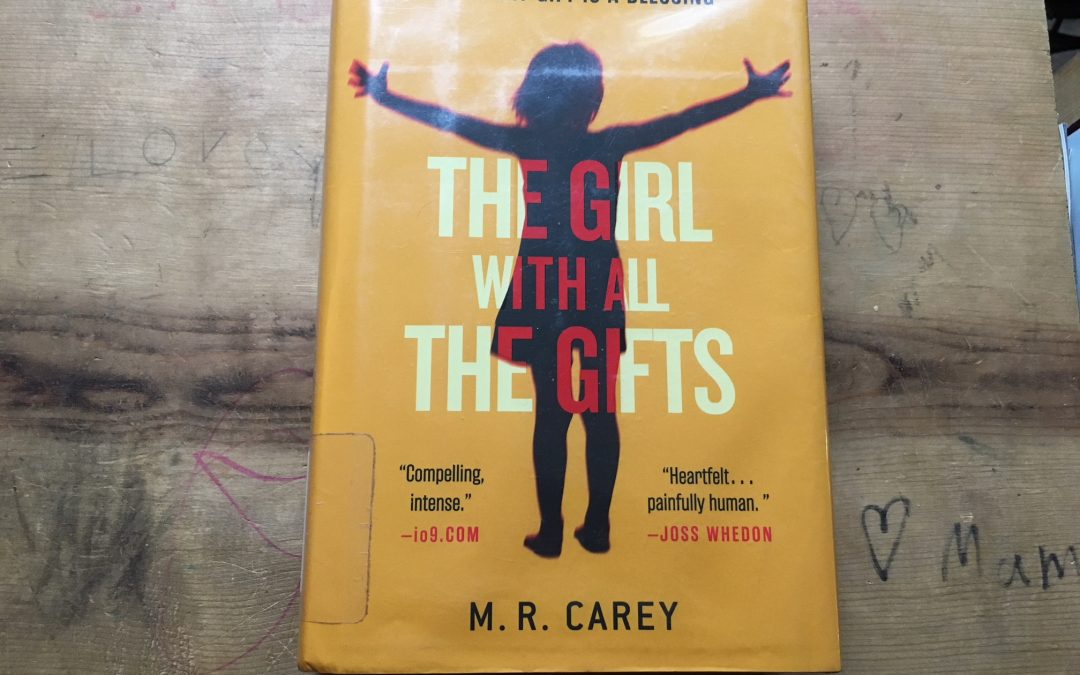
by Rachel Toalson | Books
I’d seen a couple of my writer friends talking about The Girl With All the Gifts, by M.R. Carey, and thought I would give it a try. I’m so glad I did.
I haven’t read many zombie books, because they don’t really strike my fancy. But this book was a zombie must-read. Carey has a way with words and world-building, and it was simply a fantastic look at an end-of-world scenario in which life and un-life battle.
Here are three things that I enjoyed most about this book:
- The premise. There is a virus that has overtaken the world, and it grows in the brains of people and turns them into zombies. This is a premise that has been used for zombie-apocalypse stories before, but there was something about Carey’s rules that changed things. You’ll have to read it to find out why. But I will tell you this: The Girl With All the Gifts featured zombie children and humanized a very un-human group. It was fantastic.
- The characters. This book is told from multiple points of view, and the characters were all incredibly interesting. I found each one of them likable, believable, and honorable, no matter the mistakes they’d made in their pasts.
- The horror. This wasn’t your typical hide-under-the-blankets horror, but I also had some nightmares about zombies chasing me; they are, by nature, creepy. This might be more indicative of my own incredibly horrific imagination, but it has something to do, too, with Carey’s ability to draw out the tension and then ramp up the action so you were constantly on the edge of your seat. Toward the climax, I told my family they would have to deal with the fact that I needed to finish this book; otherwise I wouldn’t be able to get out of bed because of the horror of not knowing what was going to happen—and whether it could happen to me.
Here’s the first line of the book:
“Her name is Melanie. It means ‘the black girl’, from an Ancient Greek word, but her skin is actually very fair so she thinks maybe it’s not such a good name for her. She likes the name Pandora a whole lot, but you don’t get to choose. Miss Justineau assigns names from a big list; new children get the top name on the boys’ list or the top name on the girls’ list, and that, Miss Justineau says, is that.”
Such a great beginning for a fantastic book.
The above is an affiliate link. I only recommend books that I personally enjoy. I actually don’t even talk about the books I don’t enjoy, because I’d rather forget I ever wasted time reading them. But if you’re ever curious whether I’ve read a book and whether I liked or disliked it, don’t hesitate to ask.
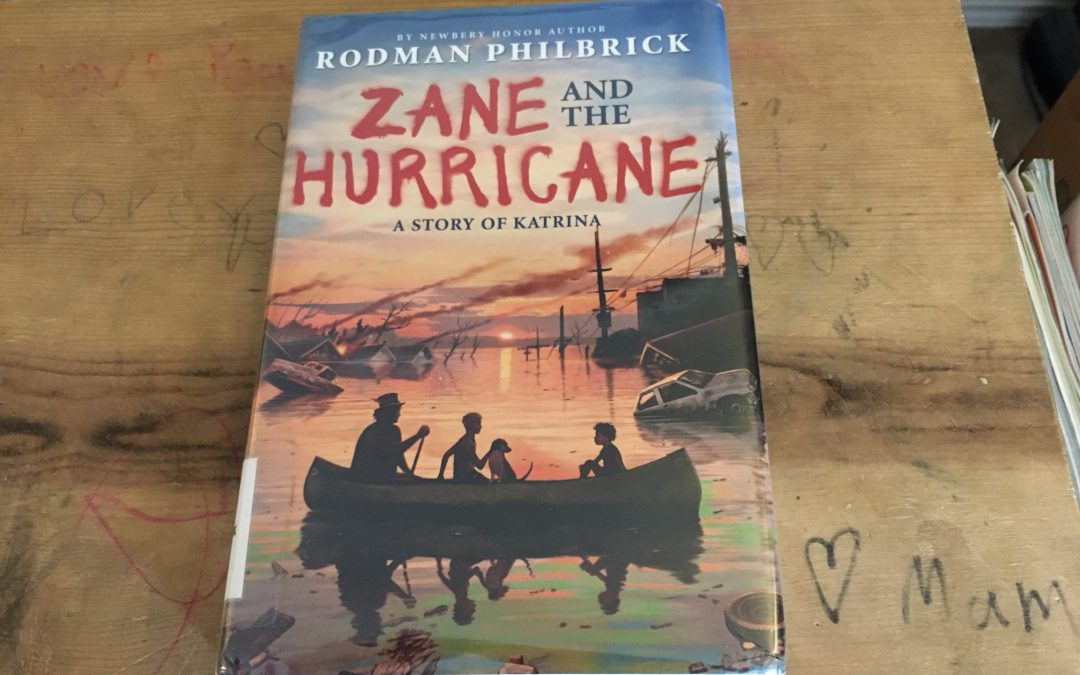
by Rachel Toalson | Books
One of my boys picked up Zane and the Hurricane, by Rodman Philbrick, because it was on the 2015-2016 Bluebonnet award list (an award given annually by the Texas Library Association). It looked so interesting that I stole it from him (he was taking too long to read it).
Zane and the Hurricane was a sweet middle grade novel about hope in the aftermath of Hurricane Katrina. A boy, Zane Dupree, was visiting New Orleans when the hurricane hit, and he experiences the terror of the winds, the loss of electricity, and the massive flooding.
I loved it, like I knew I would.
Here are three things I enjoyed most about it:
The characters. Zane was a wonderfully drawn character who had a unique way of thinking and speaking. The other characters were just as well-developed as he was.
The true-to-life events. In the author’s note, Philbrick says that everything Zane experienced happened to at least one of the survivors of Hurricane Katrina. I loved that he used real-life events to weave a story that was so engaging. It was entertaining, but it was also educational, teaching children about the power and horror of natural disasters—and an important part of our history.
The similes, metaphors, and descriptions. Zane had a unique way of seeing the world, as I mentioned above, and that really came through in the book. Take this description of Zane’s great-grandmother, whom he’s visiting in New Orleans:
“The truth is, when me and Bandy first get off the plane and this old lady is waiting there with her two canes, one in each fist, I’m kind of scared of her. She’s so wicked old and the canes look like weapons. Like hitting sticks. This really ancient lady, small and hunched with her hitting sticks. Her skin like the skin on milky hot chocolate when you blow across the top, all wrinkled and folded back on itself. Even her perfume smells like old flowers or something.”
And here is one of my favorite similes:
“One of the cops makes the mistake of saying, ‘It’s only a dog, lady.’ And this woman glares at him like she’s the sun and he’s an ice cube about to melt. “
My son got the book back and is now reading it, too. I think he loves it at least as much as I did.
The above is an affiliate link. I only recommend books that I personally enjoy. I actually don’t even talk about the books I don’t enjoy, because I’d rather forget I ever wasted time reading them. But if you’re ever curious whether I’ve read a book and whether I liked or disliked it, don’t hesitate to ask.






